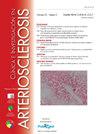Eficacia y seguridad de los inhibidores de la PCSK9 en la vida real
IF 1.9
Q3 PERIPHERAL VASCULAR DISEASE
引用次数: 0
Abstract
Objective
To confirm the effectiveness and safety of proprotein convertase subtilisin/kexin type 9 (PCSK9) inhibitors in daily clinical practice.
Methods
Retrospective observational study of patients from hospital registry of PCSK9 inhibitor treatment with a follow-up ≥ 6 months. The lipid-lowering effect and safety were evaluated.
Results
Of the 193 patients included in the study, 168 (87%) had cardiovascular disease, and 54 (28%) had familial hypercholesterolemia; 85 (44%) were intolerant to statins/ezetimibe. No differences between alirocumab and evolocumab groups regarding the rate of LDL-C reduction ≥ 50% (82.8% vs. 83.1%), achievement of the therapeutic target (60.9% vs. 65.5%), or complete remission (60.2% vs. 58.5%) were found. An erythema at the injection site in one patient treated with alirocumab and urticaria in one patient treated with evolocumab were recorded. According to the logistic regression analysis, complete remission of LDL-C in subjects treated with PCSK9 inhibitors was positively associated with increased age (OR: 1.045; 95%CI: 1.0-1.092; P=.049) and active smoking (OR: 4.562; 95%CI: 1.434-14.515; P=.010), and negatively associated with female gender (OR: 0.403; 95%CI: 0.171-0.949; P=.038), baseline LDL-C levels (OR: 0.969; 95%CI: 0.957-0.981; P<.001)and statin/ezetimibe intolerance (OR: 0.403; 95%CI: 0.176-0.925; P=.041).
Conclusion
This real-world practice study has confirmed that PCSK9 inhibitors are effective, safe and well tolerated, with lipid-lowering effects comparable to those described in randomized controlled trials, regardless of the monoclonal antibody used.
PCSK9抑制剂在现实生活中的有效性和安全性。
目的:在临床实践中验证枯草素/可欣9型蛋白转化酶(PCSK9)抑制剂的有效性和安全性。方法:回顾性观察研究医院登记的PCSK9抑制剂治疗患者,随访≥6个月。评价其降脂效果及安全性。结果:纳入研究的193例患者中,168例(87%)患有心血管疾病,54例(28%)患有家族性高胆固醇血症;85例(44%)对他汀类药物/依折麦布不耐受。alirocumab组和evolocumab组在LDL-C降低率≥50% (82.8% vs. 83.1%)、达到治疗目标(60.9% vs. 65.5%)或完全缓解(60.2% vs. 58.5%)方面无差异。一名接受alirocumab治疗的患者在注射部位出现红斑,一名接受evolocumab治疗的患者出现荨麻疹。根据logistic回归分析,接受PCSK9抑制剂治疗的受试者LDL-C完全缓解与年龄增加呈正相关(OR: 1.045;95%置信区间:1.0—-1.092;P= 0.049)和主动吸烟(OR: 4.562;95%置信区间:1.434—-14.515;P= 0.010),且与女性性别呈负相关(OR: 0.403;95%置信区间:0.171—-0.949;P= 0.038),基线LDL-C水平(OR: 0.969;95%置信区间:0.957—-0.981;结论:这项现实世界的实践研究证实,PCSK9抑制剂是有效、安全且耐受性良好的,无论使用何种单克隆抗体,其降脂效果与随机对照试验相当。
本文章由计算机程序翻译,如有差异,请以英文原文为准。
求助全文
约1分钟内获得全文
求助全文
来源期刊

Clinica e Investigacion en Arteriosclerosis
PERIPHERAL VASCULAR DISEASE-
CiteScore
3.20
自引率
6.20%
发文量
44
审稿时长
40 days
期刊介绍:
La publicación idónea para acceder tanto a los últimos originales de investigación como a formación médica continuada sobre la arteriosclerosis y su etiología, epidemiología, fisiopatología, diagnóstico y tratamiento. Además, es la publicación oficial de la Sociedad Española de Arteriosclerosis.
 求助内容:
求助内容: 应助结果提醒方式:
应助结果提醒方式:


